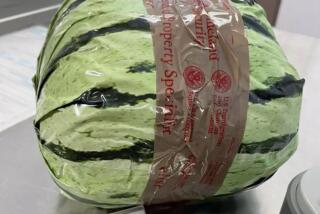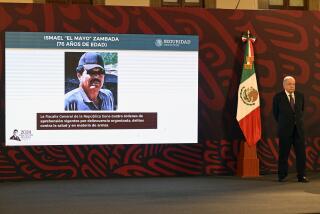Mexico-U.S. drug tunnel called a better-late-than-never find
As authorities in Yuma, Ariz., on Thursday announced the discovery of a significant cross-border drug tunnel, a federal expert on such passageways discussed the significance of the find -- as well as the cat-and-mouse game of border drug smuggling.
Lauren Mack, a spokeswoman for Immigration and Customs Enforcement in San Diego, told the Los Angeles Times that 156 tunnels have been uncovered along the United States’ southwestern border with Mexico since the early 1990s. Three out of four were discovered after 2001, the majority of which were incomplete.
Thursday’s 240-yard-long tunnel, which had been in use for nearly three months, was a “major” find and included sophisticated work such as electricity and ventilation. Mack characterized the finding of a working tunnel as a better-late-than-never story.
PHOTOS: Sophisticated drug smuggling tunnel
“We have a tunnel task force that has been very proactive on the front,” she said. “Our goal is to find them before they become open for business.”
Clever detective work and improved tunnel detection technology have made underground trafficking more difficult, authorities said. But the huge drug quantities heading across the border could also be explained by a surge in marijuana production in Mexico and, in particular, Baja California, where Mexico’s Sinaloa drug cartel has been expanding its influence.
In farm-growing regions of Baja California, farmers and laborers say the number of clandestine marijuana-growing operations has grown rapidly in recent years, straining water resources but providing more jobs.
Mack said there is a science to determining the age of a tunnel, with officials often calling in mining and forensics experts to take soil samples. “We’ve progressed in the techniques we use.”
She said the major job, once a tunnel is found, is to determine which drug cartel is behind its financing and construction, using sources and other means. Authorities say that Thursday’s bust included arrests and drug seizures.
In eight years, the tunnel task force’s biggest find was a nearly half-mile-long tunnel south of San Diego in 2006. “That’s the length of seven football fields,” Mack said.
She said she’s often amazed at the sophistication of the construction. “When we talk about sophistication, we mean ventilation, electricity, carts and machinery to push the drugs through,” she said. “There are often elaborate entryways and shored-up walls. One tunnel had hardwood flooring from entry to exit.”
On Wednesday night, Mack said, Mexican army officials found a smaller tunnel about 600 feet long that was bound for a warehouse district in suburban Otay Mesa in San Diego.
“It was on its way to becoming a sophisticated tunnel,” she said. “But we got it before it even reached the border.”
ALSO:
What is Scientology: A Scientologist explains
Paterno’s family defends coach in wake of damning Freeh report
Judge orders newspaper to provide info that could ID anonymous reader
More to Read
Sign up for Essential California
The most important California stories and recommendations in your inbox every morning.
You may occasionally receive promotional content from the Los Angeles Times.











